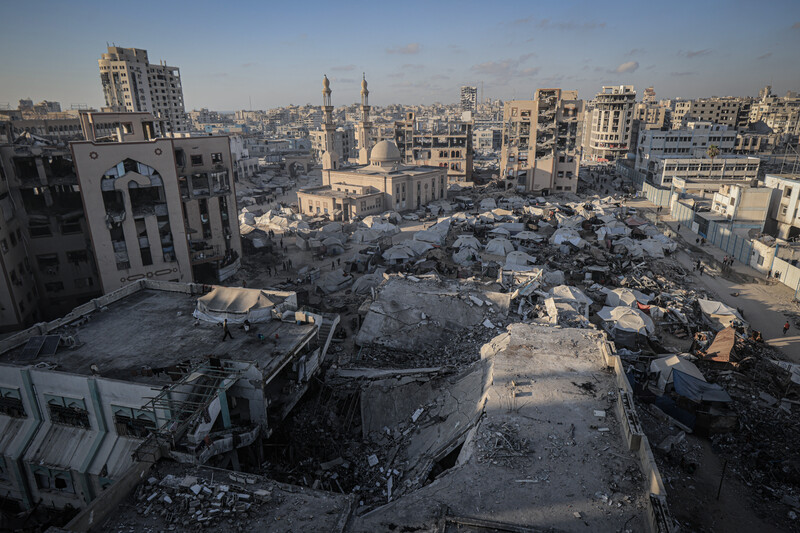2 September 2025

Displaced Palestinians living in tents amid the ruins of the Islamic University of Gaza, July 2025. Israel’s systematic destruction of Gaza’s education system during the ongoing genocide has forced students to seek scholarships at universities abroad.
Anadolu ImagesThe University of South Wales has apologized after telling a prospective student in Gaza that it is not accepting applications from Palestine.
The woman, whom The Electronic Intifada is identifying only by her first name Haya, posted on Twitter/X a partial screenshot of the email she received.
It was shared thousands of times, generating global outrage.
The full email from the admissions office, seen by The Electronic Intifada, states, “Thank you for your recent application to study at the University of South Wales.”Dated 1 September, it adds: “Regrettably, no applications from Palestine are being considered at this time, therefore, your application has been withdrawn.”
Haya told The Electronic Intifada that she was appalled by the email, feeling it was a “rejection to my homeland and people.”
That’s why she decided to publish it on Twitter/X, she said.
“Mistakenly processed”
The next day – following an inquiry to the university from The Electronic Intifada – the admissions office wrote to Haya again, informing her that the 1 September email had been sent in error and that her application would be considered.
“We do not have a policy of automatically rejecting applications from students in Palestine, and we sincerely apologize for the email received by the applicant,” a University of South Wales spokesperson told The Electronic Intifada on Tuesday.
“All applications are assessed on a case-by-case basis,” the spokesperson added. “However, due to current visa processing timelines, we are no longer able to accept applications for September 2025 entry from many regions.”
The university asserted that Haya’s application “was mistakenly processed as a 2025 application.”
The spokesperson added: “We deeply regret this error. The application has now been reinstated, and we have contacted them directly this morning to offer our sincere apologies.”
Haya’s application – seen by The Electronic Intifada – was clearly for the 2026 academic year.
The university also issued a public apology on Twitter/X.
Desperately seeking education
During the ongoing genocide, Israel has systematically destroyed Gaza’s educational institutions, including every university – and yet despite forced starvation and relentless massacres, young people there continue to pursue their educations in hopes of a better future.
Although online education has been available, it is sporadic and learning effectively while trying to survive a genocide is all but impossible for most.Many see the only viable route as seeking a scholarship abroad. However, the process is cumbersome and opportunities are limited. Evacuation from Gaza is difficult and must be coordinated between foreign embassies and the Israeli military.
Universities in Europe and the United States have accepted students from Gaza during the genocide.
However, the administration of US President Donald Trump has made it nearly impossible for new students to come to the United States, recently declaring an effective ban on issuing visas to holders of Palestinian Authority passports.
Ireland announced last week that it had evacuated 52 students from Gaza – the latest cohort to receive scholarships from public and private Irish universities.
Haya, 25, was born in Gaza City. A 2022 pharmacy graduate of Gaza’s Al-Azhar University, she applied to the masters program in health and public service management program at the University of South Wales, as well to other UK institutions.She and her family were displaced to the south of the Gaza Strip earlier in the genocide but returned to the north. Now as Israel intensifies its assault on Gaza City, they once again face imminent forced displacement in a territory with no safe place to go.
“My message to them is that the students of Gaza had distinguished universities and higher education, but they were all destroyed,” Haya told The Electronic Intifada in response to the incident.
“We are being subjected to the most heinous genocide in modern history, but we have dreams and ambitions, and we were not created to be buried with our ambitions.”
Gaza City “had hundreds of university professors, and it was an educated environment,” Haya said, “but the war is harsh and we all deserve real opportunities to stand up again after we lost everything.”
Ali Abunimah is executive director of The Electronic Intifada. Abubaker Abed is a journalist from Deir al-Balah refugee camp in Gaza.





